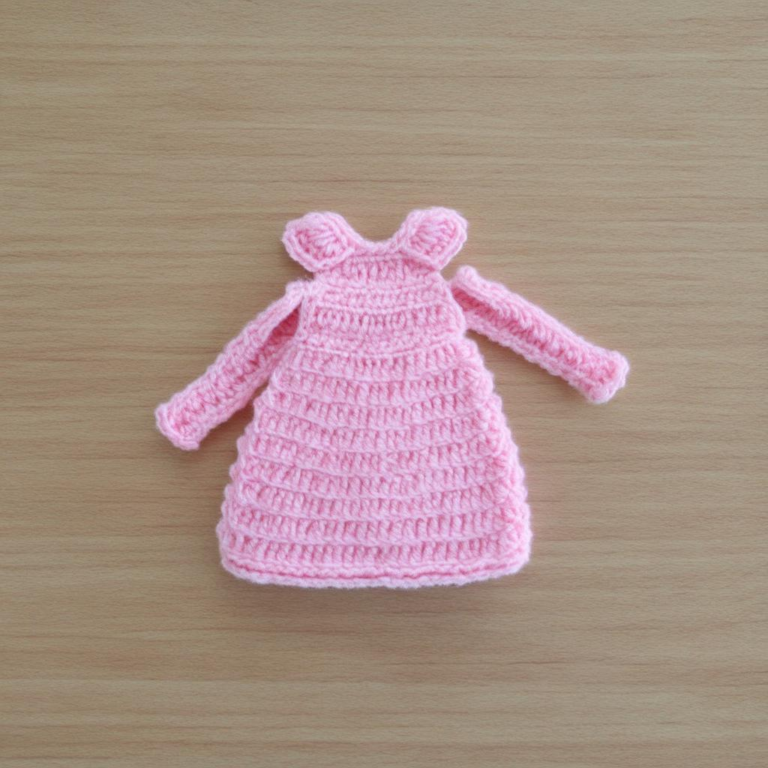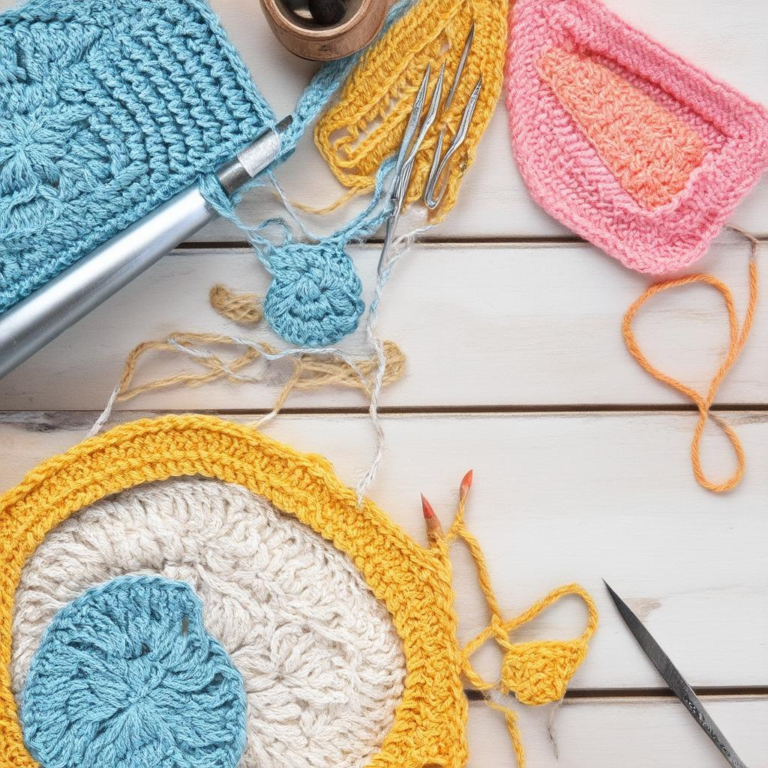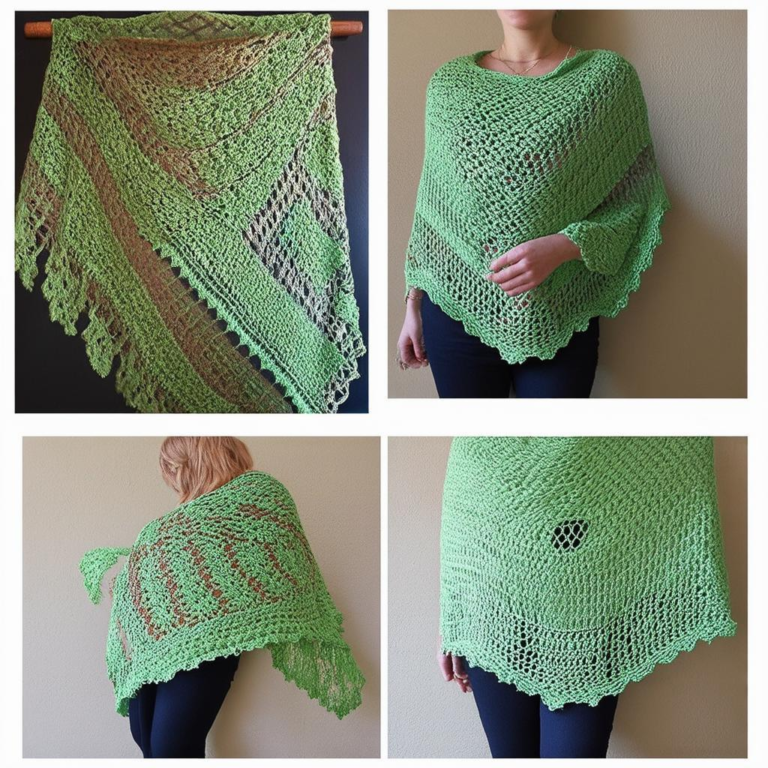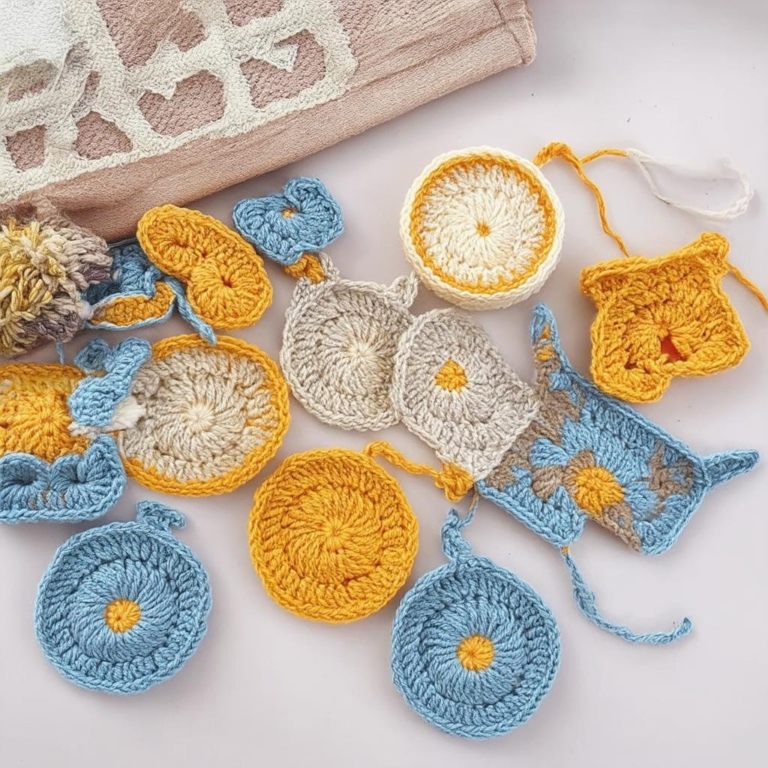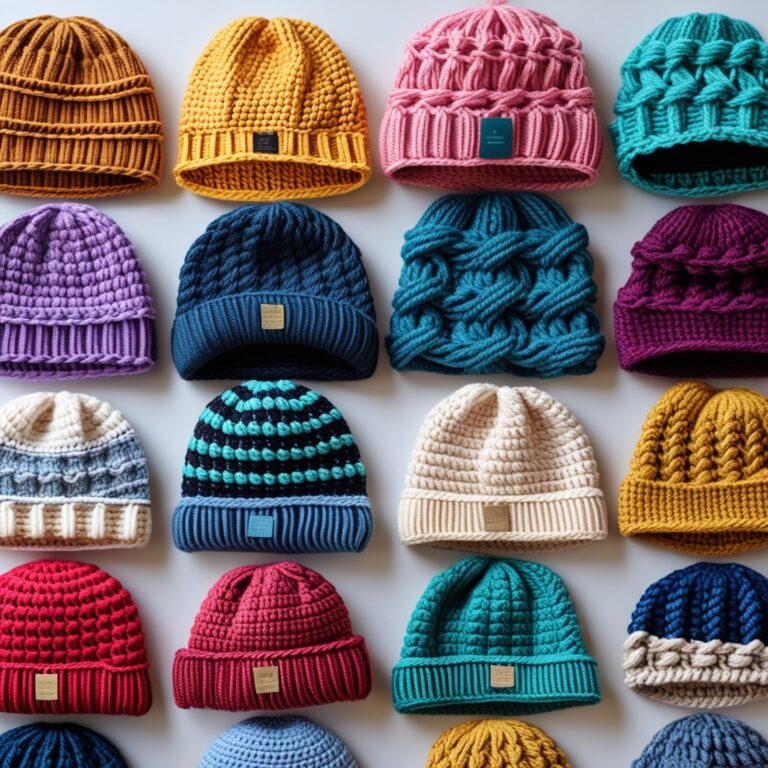[Check out the latest arrivals now!](https://www.amazon.com/s?k=beginner crochet patterns&s=date-desc-rank&tag=smartymode-20)
Best Beginner Crochet Patterns: Top Picks & Easy Projects Compared!
Embarking on the journey of crochet can feel like stepping into a whole new world of creativity and craftsmanship.the rhythmic motion of the hook, the gentle pull of the yarn, and the gradual appearance of beautifully textured fabric can be incredibly soothing and rewarding. Though, for beginners, the sheer variety of patterns and techniques can be overwhelming. This article is designed to guide you through that initial phase, offering a curated selection of the best beginner crochet patterns, along with an easy-to-understand comparison to get you crocheting confidently and enjoyably. we’ll explore a range of simple projects perfect for learning the basics,ensuring your early crochet adventures are positive and productive.[Explore Top Rated beginner crochet patterns on Amazon.]
Understanding the Basics: Your Foundation for Crochet
Before diving into specific patterns, it’s important to grasp the fundamentals. Understanding the different types of yarn, the basic crochet stitches, and interpreting patterns are key to successfully executing your first projects.
Getting Started: Essential Tools and Materials
Crochet Hooks: Available in various sizes, the hook you choose will depend on your yarn weight and desired stitch size. Start with a medium-sized hook (e.g., H/8 or 5mm) as they’re versatile for many beginner projects [1].
Yarn: Look for smooth, light-colored yarn in a medium weight (worsted or DK). This makes it easier to see your stitches. Avoid novelty yarns in the beginning as their texture can hide stitch definition.
Scissors: A small, sharp pair of scissors will be necessary for yarn cutting.
Tapestry Needle: Used to weave in the ends of yarn when you’re finished with your project.A plastic tapestry needles are safer for beginners.
Stitch Markers: These are small, removable markers that help identify key points in a pattern, essential in more complex designs.
Essential Crochet Stitches for Beginners
Learning a few basic stitches is the gateway to virtually all crochet projects. These initial skills form the foundation upon which more complex patterns are built. You don’t need to learn them all at once, but mastering these foundational stitches is your ticket to crocheting anything from scarves to blankets.
Slip Knot: This is the knot that forms the base of your crochet chain.It’s the essential first step to starting any project.
Chain Stitch (ch): Often abbreviated as “ch,” this stitch is the foundation for most projects. It creates a chain of loops and is the base for many patterns. It also is used to start most of the project.
Single Crochet (sc): A basic, dense stitch perfect for producing a firm fabric.It’s frequently enough taught as the first stitch after chain stitch as it’s simple and great for beginners. This uses one loop on the crochet hook. Double Crochet (dc): This is a taller and looser stitch than single crochet,creating a more open fabric.This uses two loops on the crochet hook and can be used alone or to create unique patterns like the granny square.
Slip Stitch (sl st): Used to join stitches together, finish off rounds, or create decorative edges. These are the stitches used to create a circle or to finish off a simple line of chains. They are quite simply pulling the loop though.
Magic ring/Circle: This is a technique used to start crocheting in the round and create a closed circle, frequently enough used for hats and amigurumi.The magic ring is a beginner technique to mastering the start of closed circles in the round.
Reading Crochet Patterns
Crochet patterns look intimidating at first, but they’re simply a set of instructions written using particular abbreviations and symbols. In this section, focus on what they frequently enough include.
Abbreviations: Patterns use abbreviations to represent crochet stitches (e.g., sc for single crochet, dc for double crochet). There are universal abbreviations that you will start to recognize as you practice more.
Gauge: Found at the beginning of a pattern, gauge refers to the number of stitches and rows within a specific measurement using the indicated hook and yarn. Matching the gauge ensures your finished project will be the planned size.
Instructions: Patterns detail the number of chains or stitches you need to make in each step. It frequently enough explains in multiple steps. Pay close attention to details, as even the sequence matters.
Repeat Instructions: Many patterns use asterisks or brackets to denote sections that should be repeated multiple times, to create a complex project while using simpler patterns.
[explore Top Rated beginner crochet patterns on Amazon.]
Top Beginner Crochet Patterns: A Detailed Look
Now that you have a basic understanding of the tools, stitches, and pattern interpretation, let’s explore some easy-to-do and well-received patterns. We’ll cover a few categories, ranging from flat projects to basic shapes to small accessories, providing options that appeal to diverse interests and skill levels.
1. Simple Dishcloth or Washcloth
A square or rectangle is the ideal crochet foundation for total beginners.It is simple and easy to create. Dishcloths or washcloths are incredibly simple, quick projects, making them a great introduction to the basics. The basic square requires simple rows of single crochet or double crochet stitches, making them an ideal project to help you practice your tension and get cozy with your hook and yarn.
Technique: Typically uses chain stitches to create the row base, then rows of single or double crochet.
Yarn Type: Cotton is ideal due to its absorbent qualities; durable and easy to get.
Why it’s great: It lets you practice maintaining even tension across a flat piece. Is very forgiving when learning.
Variations: Changing colors every few rows can introduce you to basic colorwork [5]. You can also try textures, by mixing different stitches like single and double crochet.
Difficulty: Very Easy
2. easy Beginner Scarf
Scarves are a classic first project for many crafters. A simple, straight scarf is essentially a long rectangle, making is suitable as an initial project for those just learning to crochet. It offers repetition, which helps solidify your technique and learn how to chain, turn, and maintain even stitches.
Technique: Starts with making a chain then using a single crochet or double crochet to make a row, repeating until the scarf is the desired width, then chain and turn for each row, working on top of each other.
Yarn Type: Worsted weight yarn in merino wool or acrylic blend, something soft that does not irritate skin is best for this type of beginner pattern.
Why it’s great: Teaches consistency. Can be of any size or length to learn to adapt as a basic skillset.
Variations: You can add tassels at the edges or incorporate a simple stitch pattern to make it your own [2].
Difficulty: Easy
3. Basic Coaster Set
Coasters are a fast and satisfying small project that introduce the concept of working in the round. These are great projects as they provide small, repetitive patterns that build confidence and increase skill. They are made in a circle and are worked from the center outwards. You get to practice your tension while learning new techniques like how to start with a magic ring and add stitches as you go along to form the circle.
Technique: Working in a spiral or rounds, using single or double crochet stitches. Learning how you complete the circle and add more rounds is a great basic skill to enhance.
Yarn Type: Cotton again works great for this project, as it absorbs well, is durable and is easy to get.
Why it’s great: They are small and practical, quick to complete, and allow you to experiment with colors and patterns [3].
Variations: You can try a solid color,simple stripes,or adding a scalloped edge once you have mastered the basic circle. Difficulty: Easy
4. Simple Blanket Stitch Sample
A slightly bigger project to tackle once you have your basics mastered is an easy blanket. It may seem intimidating, but a beginner stitch can make this project a more approachable prospect. Beginning with a smaller version is a great place to start for these. Usually made using just one simple stitch,it is indeed repeated and builds into a textured warm blanket.
Technique: Starting with the chain, making rows of a simple stitch ( like double or single crochet).It is a much larger project so it may take longer but can work as an easy learning tool.
Yarn Type: Bulky or super-bulky yarn is often used to help with a faster outcome. This can use different kinds of yarn, but an acrylic blend works best as it is indeed washable and still soft.
Why it’s great: Practive a larger project while using a very simple technique.This allows for understanding of patterns on a greater scale.
Variations: There are many stitch variations that can create different textures that can make this seem like a more challenging pattern while using variations of the basic stitch.
Difficulty: Easy to Medium
5. Granny Square
The granny square is a cornerstone of crochet,made from a basic series of double crochet clusters. Although it may look complex, it is actually quite simple once you understand the method. It can be used to create many different kinds of unique projects, from blankets to bags.
Technique: Starts with a magic ring or simple chain loop, working sets of double crochet stitches in clusters with chain spaces. Rounds build out from center with increasing stitches.
yarn Type: Any type of yarn can be used, however, most peopel start with a medium weight yarn.Colors can vary with the rows to make it a colorful project.
Why it’s great: A fun project as it is a stepping stone to larger projects like blankets. It is simple yet satisfying to learn.
Variations: Experiment with color changes in each round or even textured stitches in the clusters. There are numerous resources online on different variations of this pattern.
Difficulty: easy
6. Simple Headband or Ear Warmer
Headbands and ear warmers are excellent beginner-kind projects that provide an prospect to practice working in rows. Since these are often just simple rectangles that are sewn or buttoned together, it is a manageable project that is great for beginners. They are useful while being great tools to practice on.
Technique: It is a simple band that is made using rows of single or double crochet stitches in a rectangle,or sometimes it is joined to create a simple circle.
Yarn Type: Soft yarn like merino or a soft acrylic blend work best as this is worn close to the skin.
Why it’s great: They are a great way to use scrap yarn while learning to make useful things.
Variations: Experiment with different yarn thicknesses or embellishments to make them unique [4].
Difficulty: Easy
7. Basic Hat (Beanie)
Hats are an intermediate project, but you can create a simple beanie once you are comfortable with working in the round.It uses basic stitch, but increases are added to create a dome. You can learn to create a simple beanie using single or double crochet.
Technique: Begins from magic Ring and is worked in rounds that widen with increases,then the rounds are continued to form a tube that will create a hat that will fit correctly.
Yarn Type: Soft medium or heavy weight yarn types work best, as its warm and comfortable on the head.
Why it’s great: It allows for practice with basic stitches and teaches how to increase or decrease.
Variations: Add a cuff for a fold, make it slouchy, or add a pom pom [1].
Difficulty: Medium
[Explore Top Rated beginner crochet patterns on Amazon.]
Comparing Patterns: Which is Right for You?
Choosing a beginner project should be about your interests and how quickly you want to see a finished project. All of the projects detailed above provide useful skills to advance your crochet practice.
| Pattern | Primary Stitch(es) | Complexity | Time Commitment | Best For Learning |
|————————|———————————–|—————|——————-|—————————————————-|
| Simple Dishcloth | Single or Double Crochet | Very Easy | Quick | Flat tension, holding hook, simple rows |
| Easy Beginner scarf | Single or Double Crochet | Easy | Medium | Consistent Tension, turning chains, lengths |
| Basic Coaster Set | Single or Double Crochet (Round) | easy | Quick | Working in the round, magic ring, basics |
| Simple Blanket Stitch Sample | Single or Double Crochet | Easy to Medium | Long | Practicing repetitive patterns in a large format |
| Granny Square | Double Crochet Clusters | Easy | Medium | Working with clusters, basic pattern recognition |
| Simple Headband/Warmer | Single or Double Crochet | Easy | Quick/ Medium | Working simple rows with a closed stitch |
| Basic Hat | Single & Double Crochet with increases | Medium | Medium | Working in the round, counting stitches, increasing size |
Considerations for Choosing a Project
When deciding on a pattern to start, consider these points:
Time Commitment: Some projects can be finished in under an hour, while others, especially larger projects like blankets, can take days.
Motivation: Starting with a project that feels useful or aesthetically pleasing can help maintain interest and motivation.
Learning Curve: Start with something very basic to get comfortable with the tools and methods before diving into a more intermediate pattern.
personal Preference: Choose a project that aligns with your own interests and tastes.
[Explore Top Rated beginner crochet patterns on Amazon.]
Tips for Successful Beginner Crochet
Starting any new craft can bring its own set of challenges. Here are some helpful tips to make your crochet journey smoother and more enjoyable:
Start Slow: Don’t rush. It takes time to develop the muscle memory and technique. Be patient.
Practice Makes Perfect: Dedicate time to practice basic stitches until they feel natural.
Count Your Stitches: Accurate stitch counts are vital to make sure patterns work properly. Use stitch markers to keep track.
Look At Examples: Using visual examples and tutorials alongside of written patterns often helps.
YouTube and Other Resources: If you’re stuck, there are many tutorials that help with visual learners.
Check for tension: your tension is how tightly or loosely you hold your yarn as you create each stitch. Try to keep it even throughout your project. This will directly affect the appearance and size of your final piece.
take Breaks: Crochet can be surprisingly hard on the hands and wrists. Take short breaks so that you do not injure or strain.
Don’t be afraid to unravel: If your project isn’t looking right, it might help to unravel a portion of it to practice and get it looking right.
Make Mistakes: Mistakes are part of the learning process. Don’t be discouraged if your first attempts are not perfect.
Celebrate Your Progress: Acknowledge every little enhancement and success, no matter how small.
Consider a class: If you struggle to learn on your own,taking a basic crochet class can definitely help start your journey.
Join a community: There are many supportive online groups, consider joining one to share and collaborate on new ideas.
[Explore Top Rated beginner crochet patterns on Amazon.]
Conclusion
Starting with easy crochet projects is the key to building confidence and encouraging continued learning.From simple dishcloths and scarves to small blankets and granny squares, there’s a wealth of engaging patterns that are perfect for new crocheters to explore. By focusing on the fundamentals, understanding patterns, having the right tools and choosing projects that feel accessible, you will be on your way to mastering this fantastic craft. start with a simple pattern on this list to start building skills.The world of crochet is full of opportunities, creativity, and useful, practical outcomes! With patience and practice, you’ll soon be creating stunning handmade goods for yourself and your loved ones.
[Shop budget-friendly options now!](https://www.amazon.com/s?k=beginner crochet patterns&s=price-asc-rank&tag=smartymode-20)


